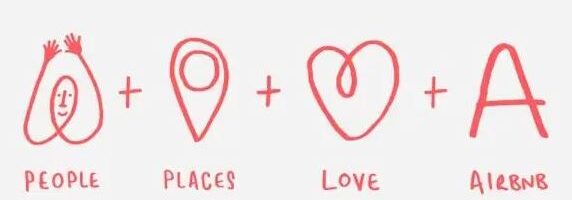Airbnb: Anywhere is ̶h̶̶o̶̶m̶̶e̶ DATA.

Airbnb came, saw and won. With a market cap of 67b$ it is the leading online travel company worldwide and with over 200 countries offered it is larger than any hotel chain.
But how did Airbnb become so successful?

Who doesn’t love to travel and relax away from the hotel concrete jungle in a beautiful villa in Bali or rent a room in the middle of the happening with the locals?
Often cheaper than hotels, unique locations, worldwide accommodations available at one click? Say no more.
Airbnb came, saw and won. Public since December 2020 (NASDAQ: ABNB) has a current market cap of about 67 billion USD and is the leading online travel company worldwide in 2021. Currently, Airbnb rooms can be booked in over 200 countries worldwide, making Airbnb larger than any hotel chain.
But how did Airbnb become so successful?
Data. Data on pretty much everything.
While we are dreamers, we are also pragmatic. At the center of being creatively-led is our design-driven approach. At Airbnb, design isn’t just how something looks, it’s how it fundamentally works.
– Brian Chesky, Co-Founder
Airbnb juggles with over 11 petabytes of data. (A lot). For that, Airbnb uses numerous tools for data analysis, including:
– A/B Testing, to specifically test new features on the website, such as display styles or button colors.
– Image Recognition and Analysis, to analyze photos and sort ads by how attractive they would be to the end user. For example, a photo of a cozy bed is more successful than one of a modern living room.
– Natural Language Processing, the algorithms analyze the language in reviews and can thus recognize and evaluate the “true tenor” of these.
– Predictive modeling, which allows Airbnb to make predictions about visitor traffic, booking probability, and market trends and growth.
– Regression Analysis, we all remember regression analysis in academic papers. Similarly, Airbnb also does this to check which features have the most impact – e.g. is a hairdryer a bigger reason for booking than air conditioning? (Probably depends on the market…)
– Collaborative Filtering, where host preferences are modeled.
“Data is the voice of your customer”
Riley newman, former head of data science at airbnb
Based on all these tools, as well as data analytics, the matching is then carried out: what are the exact preferences and priorities of the guest and those of the host, which factors such as location, time of year, type of accommodation, connection to public transport, are most important for the person booking?
“We build a model that estimated a conditional probability of booking in a location, given where the person searched” – Riley Newman
Of course, this is not only reflected on the side of the person booking, but also the landlords benefit from the data analytics, which, among other things, also suggest prices to them based on the demand and probability of a booking on a particular day.
By analyzing website data, consumer data can be mapped accurately and Airbnb manages to cater to different markets and users individually. For example, the data showed that Asian countries have a significantly higher bounce rate.
We sit at the intersection of art and science
Brian Chesky, airbnb co-founder
Customer is king.
Despite all the algorithms, which of course primarily serve Airbnb’s economic growth, the founders focus on one thing above all: the perfect customer experience. Because only a satisfied customer will be a returning customer. Airbnb therefore pursues a customer-centric approach in which changes to the website, the booking process, or the services (such as Airbnb tour guides) are constantly evaluated and adapted.
“Airbnb is about the nexus of the online and offline to create the perfect customer experience.”
– Joe Gebbia, Co-Founder
But how and at what price?
In theory, data analytics and customer centricity sound simple. But at the end of the day, it also requires the right, competent people to implement it day after day. One of Airbnb’s main challenges has been its rapid growth. With an initially small development team of under 5 people, they have managed to grow into a global champion in under a decade. The reason for this was also the constant – internal – innovation. For example, they introduced Airpal, a platform that simplified querying and visualizing the huge amount of data.
Other challenges that remain, no matter how much data is collected and analyzed: Restrictions on renting out residential properties, “over-tourimization” of local neighborhoods”, as well as the increasing housing shortage for locals, as it is more lucrative to rent out the apartment short term via Airbnb instead of long term to “normal” tenants.
To what extent a digital company like Airbnb, which does not actually own real estate, will disrupt the hospitality and real estate sector remains to be seen. What is certain is that an idea from two boys in their living room and capable data scientists has become a globally successful innovative company within a very short time.
Are you still renting or already AirBnB-ing?
Sources:
Projectpro, Airbnb, Medium, Forbes, Cloudcomputing-news, Statista, NY Times



Hi LMB, Thank you for sharing this airbnb example. As an airbnb user, I can relate to how they have made the selecting process easier over time with different filters and recommendations. You pointed out how data analytics can benefit both customers and hosts to provide a better user experience. I think that is an important key to leveraging data. You also mentioned the limitations that make airbnb challenging in terms of data; however, I’m wondering if that’s how they’re trying to differentiate themselves from booking.com? I also curious about whether they are using data to differentiate themselves from other competitors in the market.
Hi LMB,
Thanks for sharing. It has always been interesting to me how before there was AirBnB, there were sites like VRBO and Homeaway essentially doing the same thing but in a less “pretty” way. The beauty of AirBnb is that it has been able to use the data it has on consumers to effectively to create an experience. I do struggle with its viability going forward in terms of pricing. We see this across many industries where the disruptor comes in cheap and eventually has to raise prices to create a sustainable business model. In today’s economy where consumer’s are price sensitive, I wonder if AirBnb’s use of data effectively will be able to protect it from complains about rising hidden costs. Link below to an interesting article.
https://www.wsj.com/articles/airbnb-chores-cleaning-fee-11663269029
I really enjoyed reading the blog post, LMB — thanks so much for sharing. I think your/Brian Chesky’s perspective on Airbnb sitting at the intersection of art and science is spot-on: the landing page is beautifully laid out, search options are intuitive and human-centric, and the information is usually presented with the most important facts first (e.g., is the host a super-host, are the dates flexible). I think “using the customer’s data to create the perfect customer experience” is exactly what data should be, and is the right framing for any company trying to leverage data. It reminds me of the Marriott case we discussed last year in RC, and how Airbnb had gained so much market share partly because it was able to provide perfectly curated vacation packages to traveling millennials. Thanks again for the interesting read!
Thank you for sharing. As an Airbnb user, I can relate how they have disrupted the travel industry by breaking down the barriers for the customer and reducing the friction for making reservations for homestays, experiences and activities. I wonder what will be the future for Airbnb, with their fast growth, have they already crossed the chasm, or they need a new S-curve? how they can use data to continue staying competitive?